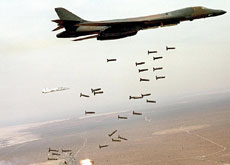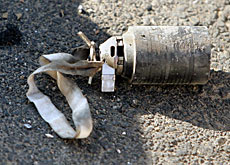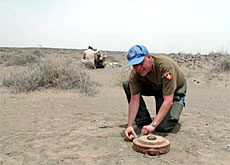Swiss back cluster bomb review

Switzerland has echoed calls for action on cluster bombs, a day after the Geneva-based International Committee of the Red Cross urged the destruction of stockpiles.
The United Nations also lent its voice to the growing campaign against cluster munitions, appealing for an immediate freeze on their use in or near populated areas.
The issue of cluster bombs dominated Tuesday’s opening of an international arms control review conference being held in Geneva.
Debate over the use of the weapon has intensified after Israel dropped them on southern Lebanon in its month-long war against Hezbollah militia earlier this year.
“Switzerland believes that a working group charged with negotiating a binding judicial instrument on munitions that create the most serious humanitarian problems – that is to say cluster munitions – is the best way forward,” said ambassador Jürg Streuli.
Streuli recalled that the Swiss government had tabled proposals five years ago to regulate cluster bombs. These included the introduction of technical improvements to reduce the number of unexploded bomblets and the destruction of stockpiles of unreliable munitions.
Moratorium
However, the Swiss ambassador stopped short of calling for an immediate moratorium on the use of cluster bombs – a demand expressed by the UN’s top humanitarian official earlier in the day.
“As long as there is no effective ban, these weapons will continue to disproportionately affect civilians, maiming and killing women, children, and other vulnerable groups,” said Jan Egeland, the UN undersecretary-general for humanitarian affairs.
“This freeze is essential until the international community puts in place effective legal instruments to address urgent humanitarian concerns about their use.”
The UN estimates that Israel dropped as many as four million battery-sized bomblets in southern Lebanon, with perhaps 40 per cent of them failing to explode on impact. The unexploded ordnance is expected to pose a risk to civilians for years to come.
In a speech read out at the meeting, UN Secretary-General Kofi Annan said they had had “atrocious, inhumane effects” on civilian populations.
“I call on you to freeze the use of cluster munitions against military assets located in or near populated areas. At the same time, we should all remember that placing military assets in such areas is illegal under international humanitarian law,” Annan said.
Stockpiles
On Monday the ICRC urged states to take a series of measures at the Geneva arms conference, which runs until November 17.
These include an immediate end to the use of inaccurate and unreliable cluster munitions and the elimination of their stocks, and a ban on using cluster munitions against military targets in populated areas.
The Swiss-run organisation said it would hold a conference of experts next year to discuss a possible new global pact on the weapons.
But on Tuesday the head of the United States delegation at the Geneva meeting, Ronald Bettauer, rejected the ICRC initiative, saying new talks among experts were unnecessary.
“We need to apply the law strictly and not start discussions on new rules,” he said.
swissinfo with agencies
No international treaties, including the Geneva Conventions, specifically forbid the use of cluster bombs.
However, the Geneva Conventions outline laws protecting civilians during conflict. Because cluster bomblets often cause civilian casualties after conflicts end – much like land mines –their use has been heavily criticised by human rights groups.
In Switzerland, parliament is due to discuss the ban on the weapons after an initiative put forward last year by a member of the House of Representatives, John Dupraz. The Swiss army has 200,000 such weapons systems.

In compliance with the JTI standards
More: SWI swissinfo.ch certified by the Journalism Trust Initiative


You can find an overview of ongoing debates with our journalists here . Please join us!
If you want to start a conversation about a topic raised in this article or want to report factual errors, email us at english@swissinfo.ch.